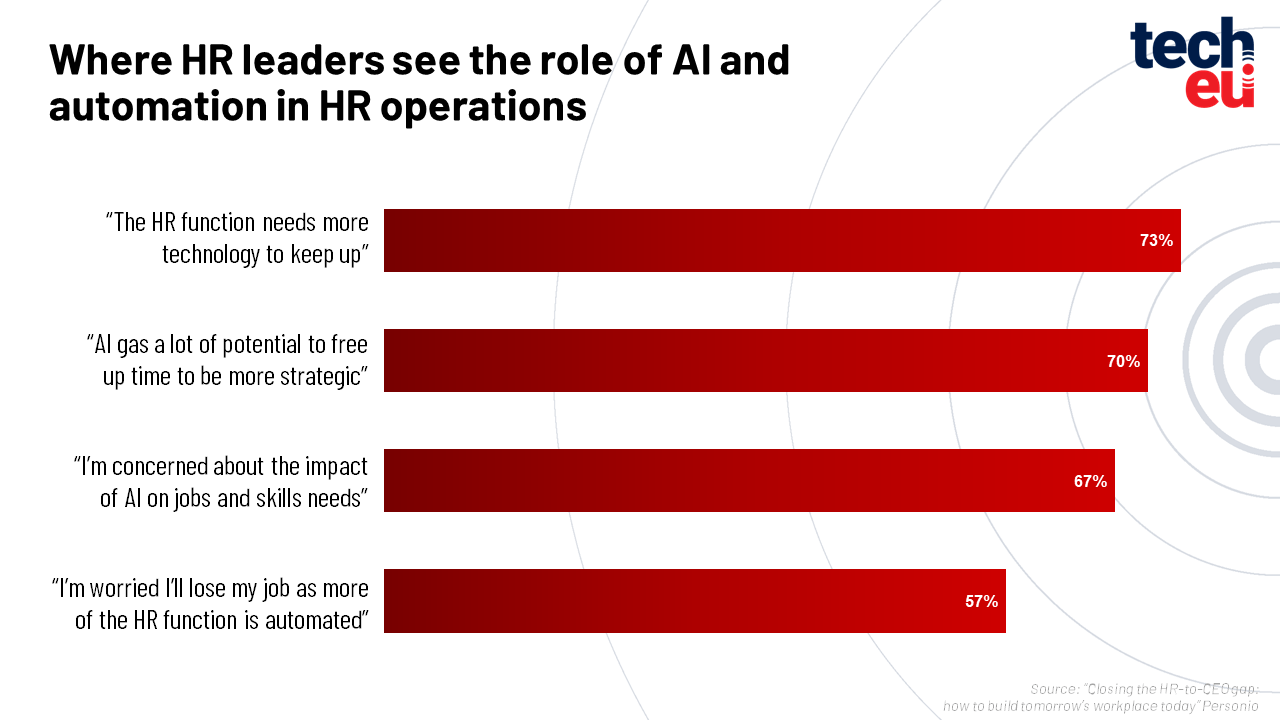There is a feeling that a day does not pass that we do not hear the comment on the impact of AI in different fields of life and work. To be clear, AI definitely has an enormous impact, but what is more important is if and how it is going to be used.
One of the industries where the influence and impact of the implementation of AI in work operations can be seen is HR. Such research on “Closing the HR-to-CEO gap: How to Build Tomorrow’s Workplace Today” which analyses the potential for AI and automation to revolutionise HR and make businesses more efficient was conducted by Personio. While the research revealed a variety of insights, one theme remained prevalent, leaders will only be successful if they keep HR’s human touch.
They surveyed 500 C-suite level executives and 1000 HR decision makers at SMEs in the UK and Ireland and documented:
- almost 74% of business leaders believe there is a need for their business to become more efficient and productive,
- 66% believe that AI and automation have a lot of potential to deliver this efficiency and productivity within the HR department.
Moreover, 66% of business leaders intend to incorporate more AI and automation into their HR department in the next 5 years.
Naturally, we can't discuss Artificial Intelligence without mentioning the hot topic du jour, generative AI, that is, Chat GPT and its many many derivatives, and the inevitable question, of whether these kinds of technologies are going to replace jobs, and if so, who, what, when, and where?
The same dilemmas are present within the HR industry, as 61% believe that HR will be taken over by AI in the future.

As highlighted in the report, these sweeping statements about the future of HR may be a symptom of a basic misunderstanding of the value that HR teams deliver to organisations. As confirmation of that, the survey uncovered a clear knowledge gap, stating that 67% (two-thirds!) of business leaders are admitting they'd like to have a better understanding of what their HR team does.
But instead of “having fear” about “replacing” HR with AI, Ross Seychell, Chief People Officer at Personio says that it is expected to see AI make HR more important instead of replacing it. He highlighted that “Emerging technologies such as generative AI tools, like Chat GPT, have the potential to revolutionise workplaces, and the HR department is no exception. But will HR be ‘replaced’ one day by AI? I certainly don’t believe so, and the business leaders that say it is possible are short sighted and worryingly misinformed about the role that effective HR plays in businesses. Instead we can expect to see AI make HR more important, by allowing a hard-pressed department to focus more on business critical issues like building a great culture or solving retention challenges, while new technology will make admin tasks more efficient .”
However, it’s not just business leaders the ones who predict the growth of AI and automation in the HR department. HR managers themselves can also see an increasing role for digital tools like AI and automation to change the HR function. As stated in the report, many of them feel uncertain about what this means for the future. So the data show that when it comes to the automatization of the HR function, 43% say they’re worried they'll lose their job.
On the contrary, there is good news:
- almost 73% of business leaders say HR will be more important to the business in the future,
- while 64% of the HR managers recognized a clear opportunity for HR departments to harness AI and automation to free up time to focus on supporting businesses with long-term goals.
Having that in mind, Seychell concludes: “Business leaders tell us that HR is only set to become more important in the future, not less. But despite this, and the importance of the function over recent turbulent years, they also admit they don’t fully understand where the role begins and ends. This challenge needs to be met head-on. HR teams will only be able to unlock their full potential if they continue to work with business leaders directly to show them the value they can bring. Meanwhile, leaders must focus their time on understanding the true value of great HR teams - after all, people are the most important, and often most invested, asset in an organisation.”



Would you like to write the first comment?
Login to post comments